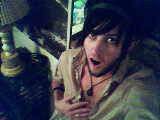
-the term "genius" alienates us from our own talents. it prevents us from creating our own great works b/c we look to others for greatness and feel we can't achieve the same kind of greatness. zadie smith is lionized by the left in this culture war, and is lifted up as a black woman writer, as an antidote to the right's patriarchal great male writers. smith portrays a very dim view of "lefty" academics. we should be able to talk about great art and great beauty hand in hand. smith seems to be anti-left through her stories of elitist academics in
on beauty.
-in the book, howard is snide and attempts to bring down great artists like rembrandt. when asked to come give a talk about the greatness of rembrandt, smith writes of howard's speech: " 'well,' he said loudly, hoping to finish it off with a daunting display of academic pyrotechnics, 'what i meant was that rembrandt is part of the seventeenth-century european movement to ... essentially invent the idea of the human,' howard heard himself saying, all of it paraphrased from the chapter he had left upstairs, asleep on the computer screen, boring even to itself."
-the above quote is an example of smith hating on the academic left, whose goal most of the time is to shame their audience into silence either through hatred of great artists or a showoff-y display of canonical knowledge. one of the reasons the left is able to feel this superiority complex is due to the fact that a college or university is NOT a place that protects beauty, rather, it is an accrediting institution. "it's like sorting peas," said laura.
-in the novel, the character of carl functions to question institutional knowledge. carl isn't paying for college but he still attends art and cultural events in the city as often as he can. in the section, "the anatomy lesson," chapter 1, carl visits wellington and runs into zora. they engage in a conversation about the value of college and the difference b/t english classes and his own spoken word poetry he records. on page 140, carl says, "the future's another country, man ... and i still ain't got a passport." his passport is another way of saying a college diploma.
-carl's argument, and his subsequent point to zora, and maybe his over role in the novel is like the lyrics to a lil' wayne rap song from tha carter III. "talkin' about it" is a rap song where he criticizes people who don't follow through with what they say, or practice what they preach. just like how many college kids just "talk about" books or topics vs. going out into the real world (at least during their time at school) and just doing it, 2 lines from the song seem particularly applicable to carl's view on colleges like wellington: "(man they just) talkin' bout it / and i'm on the streets with it."
-on page 155, smith critiques howard as a professor the worth of what he teaches and the mechanical way he goes through the motions at this point in his career. "howard asked his students to imagine prettiness as the mask that power wears. to recast aesthetics as a rarefied language of exclusion. he promised them a class that would challenge their own beliefs about the redemptive humanity of what is commonly called 'art.' 'art is the western myth,' announced howard, for the SIXTH YEAR IN A ROW."





